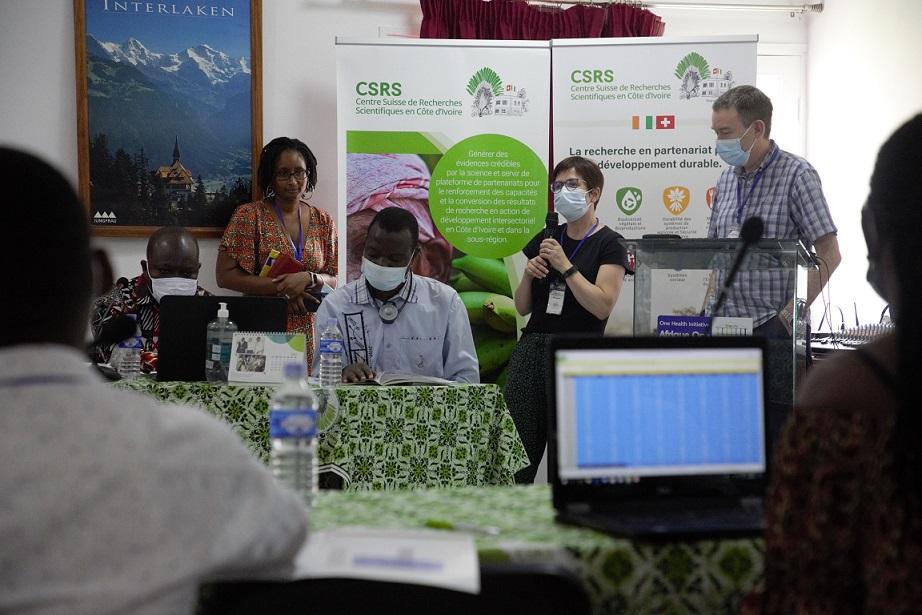"MEVacP Project": Health professionals trained in Molecular Epidemiology for Vaccination Policy.

This training, which took place in the Norbert Béhi room of the Centre Suisse de Recherches Scientifiques in Côte d'Ivoire, was addressed to scientists and public health practitioners involved in the meningitis surveillance system in Africa. An online format was also offered.
Organised by the « MEVacP project », the hybrid meeting on Molecular Epidemiology was attended by 20 face-to-face and 10 online participants, including microbiologists and health professionals, from various African countries, such as Benin, Côte d'Ivoire, Ghana, Guinea, Mali, Niger, Nigeria, Tanzania, Togo and Zimbabwe.
Four trainers conducted the exchanges. They were Dr Kanny Diallo from the Centre Suisse de Recherches Scientifiques in Côte d'Ivoire, Dr Keith Jolley, Dr Odile Harrison and Dr Jenny Maclennan from Oxford University in England. Eight other renowned scientists in the field of meningitis also led theoretical sessions or webinars; Dr Brenda Kwambana-Adams, Dr Marie Pierre Preziosi, Dr André Bita, Dr Mignon Duplessis, Pr Muhamed-Kheir Taha, Pr Martin Maiden, Pr Marc Laforce, Dr Caroline Trotter and Pr Angela Brueggemann
The objectives of this workshop were to :
1- Provide hands-on training in the laboratory and genomic techniques needed to implement molecular epidemiology studies.
2- To provide an opportunity for exchange between researchers and health professionals in order to improve the integration of research into policy development.
3- To present the resources and results generated during the MEVacP project.
Tuesday 15th March, the first day of the workshop, was marked by the presence of Professor Inza Koné, General Director of the Centre Suisse de Recherches Scientifiques in Côte d'Ivoire (CSRS) and Professor Martin Maiden, principal investigator of the MEVacP project. "This training reflects the mission of the Centre Suisse, which is to accompany research in sub-Saharan Africa and to ensure that African research is among the leaders in scientific research," said the General Director of CSRS. After the intervention of the two personalities, the kick-off of the training was given by the General Director.
The days were marked by theoretical training sessions, in which the trainers presented their course and answered the participants' questions. Practical sessions took place in the laboratory and in the classroom for the bioinformatics part, and seminars closed the day on topics related to the training theme. The announcement of the availability of the new vaccine against 5 strains of meningococcus by the end of the year, made by Professor Marc Laforce, is particularly noteworthy. This will be an important milestone in the fight against meningococcal meningitis.
"When we learned about the training on Molecular Epidemiology, we thought it was a godsend for us, because it was the first time we were going to deal with this subject..., our expectations were met in most cases, but there are many things that we received in record time," said one of the participants, Dr. Sadji Adodo, a biologist and epidemiologist from Togo.
As planned, the training ended on Friday 18 March 2022 at 5pm. It ended with the awarding of a certificate of completion to the great satisfaction of all participants.
The Training in Molecular Epidemiology for Vaccine Policy was bilingual with the provision of a professional translation service (French/English). It was also entirely free of charge for all participants, with registration done online through a registration form.







